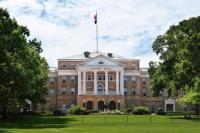The battle royale being waged against ”frackademia” at SUNY Buffalo has reached a tipping point.
On Oct. 31, the UB Coalition for Leading Ethically in Academic Research (UB Clear), a consortium of faculty, students, alumni and other community members, issued a letter and accompanying report declaring that it’s time for the increasingly controversial SUNY Buffalo Shale Resources and Society Institute (SRSI) to skedaddle. UB Clear concluded the report, requested by the SUNY Board of Trustees and published under the auspices of the office of President Satish K. Tripathi, was a whitewash.
UB Clear explained,
On 12 September, the SUNY Board of Trustees asked UB for a report on the Shale Institute. On 27 September, UB President Satish K. Tripathi sent UB Chancellor Nancy Zimpher that report. On 12 October, the Trustees made it public. We believe President Tripathi’s report fails to respond candidly to the Trustees request and the questions posed by New Yorkers since this spring.
UB Clear offered an ultimatum to make all documents related to SRSI available for public viewing and upped the ante, demanding “that the Shale Institute itself be closed, that its first publication (which we referred to as a “shill gas study”) be formally recalled, and that UB establish clearer policies for regulating conflicts of interest and public-private partnerships.”
Jim Holstun, Professor of English at University at Buffalo and Chair of UB CLEAR, stated in a press release encompassing the report:
It is time for UB administrators remember that they are employees of the citizens of New York, not PR flacks for potential corporate donors with no genuine interest in education and scholarship. Making mistakes isn’t the issue—mistakes are a given for scholars. But doggedly standing by mistakes, as have the authors and UB administrators, carries us from the realm of rigorous and legitimate scholarship to the realm of public relations and policy advocacy.
As a collective body, echoing the conclusion reached by DeSmog in direct aftermath of the President’s Office report, UB Clear said that the SUNY Buffalo’s higher ups are being “evasive and non-responsive to the Trustees’ request, providing yet another example of pro-fracking propaganda in academic guise.”
The Chancellor’s office has yet to respond, though it looks likely that the issue can no longer be ignored by Chancellor Zimpher.
Photo Credit: Suzanne Tucker | Shutterstock.com
Subscribe to our newsletter
Stay up to date with DeSmog news and alerts






